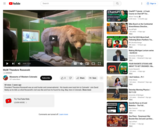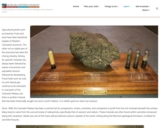To prepare to view the TCE animation, students could view the 'A Civil Action' movie and the instructor could read to them excerpts from the trial testimony and images from Woburn, wells G and H, geologic materials, geologic cross sections, the trial participants, and the federal courtroom in Boston (available as a attachment to this activity and at a website listed below). The discussion in Bair (2001) about scientists in the courtroom, the specific (excerpted) testimony presented by the three expert witnesses in the 'A Civil Action' trial, a chart summarizing the differences in their testimony, and the views of a federal judge on the goal of science versus the goal of a civil trial may also be worthwhile reading by the class prior to the assignment.
The instructor could also show students the large plates included in the USGS report by Myette and others (1987) that display potentiometric data and contours before and after the famous aquifer test performed in December 1985 and January 1986, just before the trial, and discuss the ramifications of having only two sets of water-level measurements to characterize all the changes in the flow system between 1964 and 1979, when wells G and H periodically operated. This makes students consider the substantial differences in making predictions based on a steady-state conceptualization of the flow system or a transient conceptualization.
The instructor could also show the animation of induced infiltration from the Aberjona River to wells G and H that also was created by Martin van Oort (M.S., 2005) and based on the research of Maura Metheny (M.S., 1998; Ph.D., 2004) at Ohio State University. Viewing both animations enables students to see that the water produced by wells G and H is a highly transient mixture derived from many different source areas within the valley.
The article by Bair and Metheny (2002) concerning the remediation activities at the Wells G & H Superfund Site could be used to show how groundwater contamination is cleaned up, why different remediation schemes needed to be used in different hydrogeologic settings, and why cleanup to U.S. EPA standards can take decades.
(Note: this resource was added to OER Commons as part of a batch upload of over 2,200 records. If you notice an issue with the quality of the metadata, please let us know by using the 'report' button and we will flag it for consideration.)


